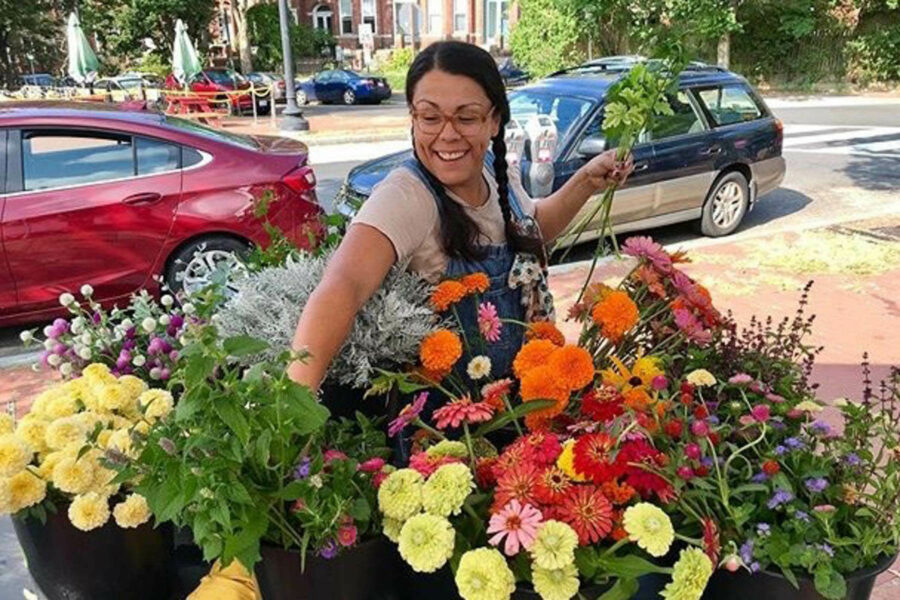Beautiful Bay blooms

Shopping for flowers can be a great way to show love to the people you care about, but those purchases aren’t always cherished by the environment.
Eighty percent of flowers sold in the United States are imported from other countries, which often means that high levels of preservatives are used to help them make the long journey. These countries often have fewer environmental regulations than in the U.S., and the transportation alone contributes to greenhouse gas emissions.
Even in the U.S., flowers aren’t always grown with best environmental practices in place. While your grocery store variety bouquet might look pretty for a few days and put a smile on someone’s face, they contribute to larger environmental issues.
But it doesn’t have to be that way! Across the Chesapeake region, multiple farmers and florists are ready to help you find locally grown flowers. Local flowers themselves are not only better for the environment, but many flower farms are using sustainable agricultural growing practices, like cover crops, riparian buffers and little and no pesticide use to keep runoff to a minimum.
In Hyattsville, Maryland, farmer and florist Cristina Flores grows local flowers and sells them through a Community Supported Agriculture (CSA) program in the DC metro region. She uses regenerative farming principles at her two growing locations, like using cover crops and less fertilizer—whatever will reduce runoff and preserve the soil health.
Flores believes the ephemeral nature of flowers is attractive to people, and that the seasonal availability of local flowers makes them even more enticing. Once people start buying local flowers, it is a learning experience for them. Through her CSA, Flores introduces customers to new species and varieties week by week. One of her flower CSA clients even used her bouquets to lead weekly science lessons with their children.
Local flowers like the ones Flores grows last longer because they avoid the travel time it takes to get on to store shelves. While commercially grown blooms are bred to travel thousands of miles, local varieties are bred for vivid colors and better smell. By shopping for local varieties, you can discover wider selection of flowers.
Priscilla Wentworth, owner of Anchored Roots Farm in Hollywood, Maryland, is another florist focused on her environmental impact. Her farm sits less than 100 feet from the Patuxent River and less than 20 miles from the Chesapeake Bay. Born and raised in Maryland, the beauty of the region inspired her to start her farm here and she does everything she can to preserve it.
“We are big believers in evolving technology, but we are still proponents of growing food and flowers with the least amount of off-farm inputs,” said Wentworth. “This can be challenging, but it's part of our goal to improve soil health, keep our wildlife, and water quality healthy, and nourish our neighbors.”
The flowers and food Wentworth grows on her farm feeds the minds, bodies and souls of her neighbors, and the perennial crops she added to the farm provide food and habitat for local wildlife. In 2020, Anchored roots added 200 new trees and shrubs to their property. The perennial shrubs also decrease the negative impacts of tilling, and any land that is exposed is quickly planted with cover crops, which keeps runoff from entering the nearby waterways. Wentworth also uses organic growing techniques to decrease her need for pesticides and fertilizers.
Even farmers growing on large plots of land maintain many of these sustainable growing practices. Michelle Elston, owner of the 10-acre Roots Cut Flower Farm in Carlisle, Pennsylvania, sells 25,000 supermarket bouquets every year, in addition to the flowers she uses for events, and is still dedicated to using sustainable practices. Even after seven years of working on her property and 15 years owning Roots Cut Flower Farm, Elston is always learning about how to improve her agricultural practices.
“Understanding the science behind every input and practice, researching new products and techniques, and considering the farm through the lens of a broader ecosystem all inform our techniques,” said Elston.
With the growing number of flower farms in the region, resources are becoming available for consumers. The Maryland Cut Flower Growers Association can help you find a farmer in D.C., Maryland or Virginia and they have a guide to regional flowers so you know what to expect each season. Florists like Local Color Flowers in Baltimore, Maryland and Little Acres Flowers in Washington, D.C. take the guess work out of shopping by working exclusively with local growers. If you’re out shopping for flowers, look for the Certified American Grown label or find a specialty cut flower grower near you.
Local florists are growing a movement in the Chesapeake region, educating consumers, building our economy and protecting our waterways all while promoting diverse, locally grown flowers. By working with local flower farmers and florists, you can contribute to these goals while still bringing home a dream bouquet for you or your loved one.

Comments
There are no comments.
Thank you!
Your comment has been received. Before it can be published, the comment will be reviewed by our team to ensure it adheres with our rules of engagement.
Back to recent stories